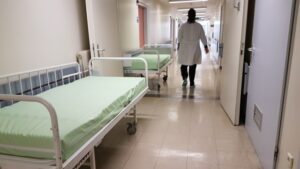Coverage of the entire Greek adult population with a Personal Physician, the start of free visits to pediatricians for 530,000 children, and the provision of a financial incentive for young doctors to choose the specialties of General Medicine or Internal Medicine, among others, is provided for in the Health Ministry’s bill on Primary Health Care.
The draft law “Reform of the Institution of the Personal Physician – Establishment of University Health Centers and Other Provisions” has been put to public consultation (will remain until 8/10). With it, it seeks to improve the health of the population with an emphasis on prevention, health care for all, and the reduction of inequalities.
As set out, now every citizen will have the opportunity to register free of charge with a doctor in the area where they live and reside, as the number of those who have the opportunity to become Personal Physicians increases significantly. The system of disincentives that provided for “penalties” for citizens by not registering as a Personal Doctor is abolished, which had not been implemented as there were not enough doctors for the entire population until now. Under the proposed changes, citizens who do not register with the Personal Doctor by 1 June 2025 will be automatically enrolled.
For the first time, financial incentives are given to young doctors. Specifically, each physician who chooses in the year 2025 to train in the specialties of either General/Family Medicine or Internal Medicine will receive a one-time payment of 40,000 euros in gross salary (in net salary they will receive 20,000 euros at the start of the specialty and 10,000 euros at the end of the specialty).
At the same time, the Ministry of Health, always focusing on the effort to reduce inequalities in access to health, is institutionalizing the Personal Pediatrician. In the first phase, some 530,000 children will have free access for the first time.
In addition, 7 University Health Centres are being established, one in each Medical School/Department of the country, which will be staffed by faculty members. In these, Telemedicine Stations will be operated and under the Telemedicine Network, there will be 3,500 home care points across the country. Thus, wherever they live in the country, patients will be able to receive home care with 24-hour uninterrupted medical monitoring.
“Strengthening primary health care is at the heart of our reform work. With our new bill that went up for public consultation today, we are strengthening the preventive and preventive medicine component of our country through the institution of the Personal Physician for all citizens, while at the same time extending the measure to pediatricians with the aim of covering free visits for 530,000 children aged 0-16 years. In addition, from 1/1/2025, with the aim of integrating more pathologists into the system than the existing ones, we will provide doctors who choose Pathology or General Medicine as their specialty with a financial incentive of 40,000 euros once, in addition to their salary. But apart from the Personal Doctor measure, the new bill introduces a very innovative idea that I believe will completely change the healthcare map. We intend to establish seven (7) University Health Centres, which will operate as Telemedicine Stations to effectively monitor and treat medical cases for residents of islands and remote areas. Next summer, on all Greek islands, citizens will have the option, wherever they are, to access Telehealth from their mobile phones. This for me is a revolution in the health sector that will solve the perennial problem of access to Primary Health Care for patients in remote areas such as our islands and at the same time will lead to saving thousands of lives of our fellow human beings”, said the Minister of Health, Adonis Georgiades.
Deputy Minister of Health, Irini Agapidaki, said: “Every citizen should have access to health care without discrimination, which is a priority for Prime Minister Kyriakos Mitsotakis. In the Ministry of Health we are constantly working in this direction. With this bill we want the system to work more fairly and more efficiently. Every citizen should have their Personal Physician who will guide them and play an important role in the care and prevention of their health. For the first time, we are incentivising young doctors to choose a specialty that will lead them to become a Personal Physician, and we are making sure 530,000 children have a Personal Pediatrician for free. At the same time, the establishment of University Health Centres and the introduction of telemedicine are an important first step in strengthening Primary Health Care, seeking to ensure that medical care reaches every citizen, even if they live in the remotest corner of our country. We continue steadily and effectively with the National Prevention Program with free screenings and changes in Primary Health Care to strengthen population health to prevent disease, gain more years of healthy life and reduce health disparities. Our commitment to social justice is put into practice through tangible results.”
Detailed seven key changes in the draft law:
More Personal Physicians: The categories of Personal Physicians are increased as all field service physicians and physicians who wish to obtain General/Family Medicine residency during their training are now added. It is noted that, all Personal Physicians of each category will be trained to enable them to perform their role more effectively especially in relation to Prevention.
Financial incentives for young doctors: For the first time, a one-time payment of 40,000 euros in gross salary is given to those doctors who choose in the year 2025 to train in the specialties of General/Family Medicine and Internal Medicine.
Automatic registration: Those citizens who do not register with a Personal Physician of their choice by 01.06.2025 will be automatically registered by the system as a Personal Physician. It is noted that registration will be done at the Municipality or Neighbouring Municipalities level so that the citizen has access to a doctor close to where they live, reducing access barriers.
Establishment of a system of performance indicators for personal physicians: An effective system of performance indicators for personal physicians is established, based on objective data, such as participation of the registered population in prevention activities, etc.
Personal Pediatrician for children: The first phase of free access to a Personal Pediatrician for 530,000 children aged 0-16 years is launched. The Ministry of Health seeks to increase the number of available paediatricians by 100 to cover over half a million children in the first phase and in the next phase to increase the coverage rate of the child population.
7 University Health Centres: University Health Centres shall be established one in each Medical School/Department of the country. The University Health Centers will have faculty members (5 in each Health Center for Attica and Thessaloniki and 4 for other regions), focusing on providing Health Prevention and Health Promotion services to citizens, training of PHC physicians, research, development of programs aimed at community health promotion and provision of telemedicine services.
Telemedicine Stations and 3,500 home care points across the country: Telemedicine Stations are being introduced at University Health Centres to enable faculty members who will undertake the work of Emergency Medicine to examine citizens living in remote areas and advise their colleagues appropriately so that emergencies can be dealt with in a timely and effective manner and unnecessary hospitalizations can be reduced. In addition, the Telemedicine Network includes 3,500 home care points across the country so that patients can receive home care with 24-hour uninterrupted medical monitoring wherever they live in the country.
Ask me anything
Explore related questions





